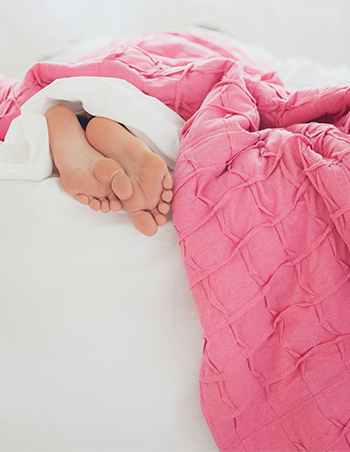
Sleep: The Ultimate Biohack for a Healthier Life
Date: 02/02/2024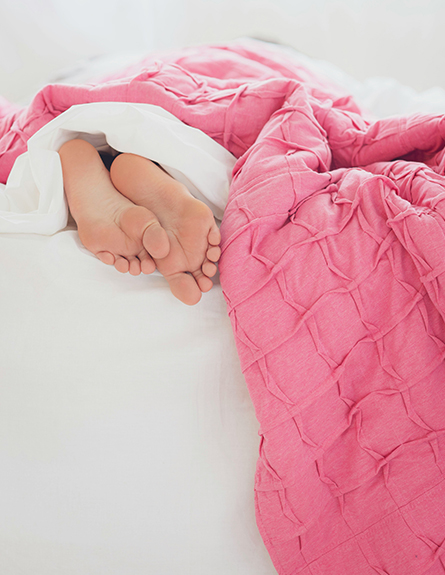
Follow along as I explore the latest in sleep-related research to discover the benefits of a good sleep, and what we can do everyday to make sure we’re taking enough rest–mind, body, and soul.
As you have probably noticed from my posts, articles, and videos, I have more recently been taken by the concept of preventative healthcare than ever before. This is a style of healthcare that doesn’t wait until you have a symptom–instead, it makes time for your health now before you have to make time for any illness later.
In fact, I suspect it is this interest that has led me to the school of biohacking, which is (at its most basic) the practice of activating the existing ‘tools’ our bodies already have to maximize future health outcomes. And as someone who lives with chronic illness, this type of approach has shown me the true power of integrating the health ‘secrets’ our bodies know already.
And what’s one of the biggest ‘tools’ our bodies have to make sure we’re performing at peak function? Sleep.
Yes, sleep one of the most commonly shared aspects of the human experience, and yet so many of us are not getting enough of it. From childhood to adulthood and beyond, we are finding less and less time for sleep amid a world of stimulation–whether that be close social connections, work, or too much screen time. Sound familiar?
Now, we all know we’re supposed to be getting about 7 to 9 hours of sleep a night. When was the last time you consistently were able to get that kind of sleep? Worse yet, you’re not alone. About 35% of US adults report getting less than 7 hours’ sleep in a 24-hour period, while about 70% of our high school kids are getting less than that. Which doesn’t include the almost 15 million children in the US who are not getting the rest they need to function and develop optimally.
DID YOU KNOW? According to this article, public safety surrounding sleep has become a documented issue in the US, revealing that the Exxon Valdez Oil Spill has been linked to inadequate sleep. As such, national organizations (even the Department of Transportation!) have begun to prioritize spreading public awareness about the importance of sleep!
Thankfully, we’re in an age where we have been able to measure, record, and learn more about sleep, and how we function with and without sleep–all thanks to the invention of the electroencephalogram (EEG) machine! What that means is, we’re better able to grasp the realities of how our sleep patterns affect a wide range of disorders, including obesity, hypertension, cardiovascular disease, immune function, mood disorders, dementia, and more. In response, we’ve begun to connect the dots between certain practices, treatments, hormones, and supplements can work to benefit our sleep patterns and ultimately improve our physical, mental, and emotional wellbeing across the board…
…which is exactly what I want to explore today with you during this article. I can’t adequately explain how excited I am to share what I’ve learned on the topic of sleep, and I can tell you that I immediately feel motivated to make the small, subtle changes to my routine that will ensure I am getting the right amount of sleep over the long-term; not just a few days a week, but every day.
Not to mention, because of the lack of awareness about how deeply sleep affects our health, and since it is rare that a medical professional will query a patient about their sleep habits during any kind of screening – only 10% of primary health professionals described their knowledge of sleep as ‘good’ – it is clear that we all have to do our part to spread the word about the power of sleep, and how it is really the most foundational biohacking method we have available to us when it comes to cognition, recovery, and wellbeing.
So let’s take control of our sleep, and watch as our days become more energized, alive, awake, and inspiring through rest. First, I think we should all get a little more familiar with what sleep is. Here we go!
What is sleep?
You might think this is a silly question, but honestly, I thought it was interesting to rehash my understanding of sleep, especially since there are still so many questions surrounding what sleep actually is (and does) in the scientific community!
Yes, we all lie down to do it, but what is actually going on when we close our eyes? Well, most researchers can agree that sleep is a process of the brain. While the body rests, the brain sleeps and incorporates a complex array of biological phenomena. For example, when we sleep our bodies facilitate non-rapid eye movement and rapid-eye movement stages (NREM and REM). As we cycle between these stages, different regions of our brain, our neurotransmitters, our hypothalamus, and the release of melatonin become activated, supporting the regulation of that cycle.
Now, there is a ton of data on sleep since we’ve been able to study it, and even prior to the invention of the EEG I mentioned earlier. For example, we have evidence to suggest that sleep plays an active role in:
- Emotional regulation
- Expulsion of toxins
- Cellular maintenance
- Synaptic plasticity and memory function
- Metabolic function and energy balance
We also know that when healthcare professionals do screen for sleep behavior, and provide solutions attuned to that specific symptom, other health behaviors (such as diet, smoking, and physical activity) are radically improved as well.
Now, while some researchers are convinced that these elements of sleep research do not necessarily describe the truly multifaceted nature of sleep itself, I believe what we have found so far is by and large on the mark. I also understand that these researchers are more concerned with other factors that may contribute to reduced sleep, and believe we should put more energy into our research there–which I support.
This is likely why most sleep researchers today are most concerned with measuring sleep initiation (how quickly one falls asleep), sleep maintenance (how long one stays asleep), sleep consistency (when one wakes and falls asleep), and sleep environment (where a person falls asleep), since these factors are what are most predominantly affected by waking stress and anxiety, lifestyle habits, and other medical conditions we may carry throughout our lives.
What are the benefits of good sleep?
As I mentioned before, common consensus puts the right amount of sleep at 7 to 9 hours per day, since after 16 hours of recorded wakefulness, cognitive abilities begin to show symptoms of decline. Here’s how one medical researcher puts it in their own words:
“When duration of sleep drops below seven hours, and especially when it starts to move toward six and half hours or less, a number of different disorders begin to increase in prevalence.Most experts would agree that there is a kind of sweet spot that most people should aim for, and for the average healthy adult that zone is ideally somewhere between 7 and 7 and a half hours.”
So what exactly are the observable benefits that arise when we look at those who are getting adequate sleep?
The answer is admittedly complex, yet what we do know is that sleep has been correlated with almost the full breadth of our physical, mental, and emotional wellbeing. According to popular research on the subject, this is how:
Sleep supports good memory and recall
As I mentioned before, common consensus puts the right amount of sleep at 7 to 9 hours per day, since after 16 hours of recorded wakefulness, cognitive abilities begin to show symptoms of decline. Here’s how one medical researcher puts it in their own words:
“When duration of sleep drops below seven hours, and especially when it starts to move toward six and half hours or less, a number of different disorders begin to increase in prevalence.Most experts would agree that there is a kind of sweet spot that most people should aim for, and for the average healthy adult that zone is ideally somewhere between 7 and 7 and a half hours.”
So what exactly are the observable benefits that arise when we look at those who are getting adequate sleep?
The answer is admittedly complex, yet what we do know is that sleep has been correlated with almost the full breadth of our physical, mental, and emotional wellbeing. According to popular research on the subject, this is how:
Sleep regulation improves literacy and perception
During a test that had two groups of people engage in a motor-learning task in the morning, then again 12 hours later, and then once more after engaging in either more or less sleep – and in many other tests just like it – results have shown that sleep can ultimately improve the functioning of our neural processing. It can also improve our ability to process and formulate new insights, to incorporate and perceive languages and the nuance of language, as well as help with visual discrimination.
This effect has been shown to impact us from our earliest development as well, whereby consistent sleep and a regular sleep schedule was already providing major support to our ability to develop language, regulate our emotions, develop strong attachment styles with our parents or guardians, and to help sustain overall family functioning (parents will know how much that sleep schedule provides much needed reprieve to accomplish the daily tasks of living…or even catching some more sleep yourself!).
Consistent sleep helps us recover more quickly from periods of restlessness
Research suggests that if you are getting regular, consistent sleep, that you’ll actually be able to improve your performance and alertness throughout the day.
What’s more interesting though, is that consistent sleep also builds up our sleep ‘bank’, meaning those times we end up losing out on sleep are easier to recover from than if we hadn’t had a lot in our sleep ‘bank’.
In other words, the more sleep you get, the less tired you’ll be after that one all-nighter you pulled to study for school, or celebrate your friend’s wedding! This also provides excellent evidence for why we should be looking at a long-term approach to improving sleep, with subtle changes that eventually help us get the sleep we’re looking for.
Aside from these incredible benefits, there is much research to be done on other potential links between sleep and improvements in our health. I will discuss this later, but there is verifiable evidence that a lack of sleep impacts our immune systems, our weight, and our heart health, which means that MORE sleep likely reduces the potential of those impacts. Finally, we can note that without any study at all – though some research has been done in this area – that sleep has an incredibly positive impact on our ability to be creative and problem solve, and to be productive at what we set our minds to as well!
What happens when we don’t get enough sleep?
DID YOU KNOW? According to this article, going without sleep for 20 to 25 hours is comparable to a blood alcohol level of 0.10%.
There’s an interesting study I found that looks at the effects of sleep deprivation on medical interns that I think helps answer the question of what happens when we don’t get enough sleep.
During the study, interns that worked a ‘traditional schedule’ were 36% more prone to making serious medical errors while on the floor when compared to those who had a schedule that prioritized time for sleep between shifts. This just goes to show how sleep deprivation (particularly in a high-stakes, high-stress environment) can great exacerbate inattention, indecision, and ultimately, recall of a previously learned behavior.
I bring this study up because it really points to the way that sleep loss, or lack of sleep, can negatively impact the regular functions of our brain. For instance, there is strong indication that shorter sleeps and low-quality sleeps are often correlated with:
- Cardiovascular problems (leading to death)
- Increased risk of stroke
- Glucose intolerance leading to obesity, diabetes, heart disease, and hypertension
- Coronary heart disease
- Mood disorders like depression
- Reduced quality of life
- Difficulty concentrating
- Daytime sleepiness and reduced alertness
- Slow reaction times
According to this article, these sorts of small impairments can have a huge ripple effect that makes me feel we need to be taking the issue of sleep much more seriously than we have been. For instance, almost 5% of adults across just 12 states in the US admitted in 2009 to nodding off while driving in the previous 30 days. Even before that, in 2005, tired drivers were the primary cause behind over 100,000 car accidents and 15,000 fatalities.
With this in mind, and considering the benefits we talked about already when it comes to getting a good sleep, let’s take a closer look at how sleep deprivation and low sleep quality can affect our day to day. Hopefully, by the end, you’re as convinced as I am that improving your sleep should be the number one thing on your list of healthcare aims!
Sleep deprivation negatively impacts mood, performance, and hormone regulation
One study I found looks pretty closely at the sleeping patterns of those who work full-time, which is often one of the main causes of sleeplessness among adults in the US, and finds that pre-sleep arousal caused by shift work or high-stress jobs predict fewer hours of sleep, and higher difficulty falling asleep. When we then look to adolescents and children, we find that insufficient sleep has been associated with depressive symptomatology, more family disagreements, and at-risk incidents around the home, school, and nearby neighborhoods. Together, these results point to just how insidious the lack of sleep is to our capacity to function in a well-behaved manner while awake!
Restricted sleep has also been shown to have a huge impact on our hormone levels and capacity to perform during waking hours. This article has two amazing tables that summarize these effects well, and so I’ll copy them here for your convenience (though I recommend the full article as well!):
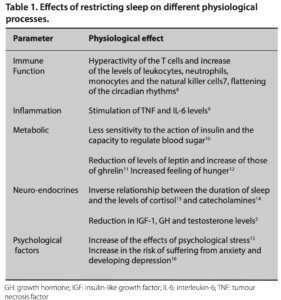
As you can see from this first table, restricted sleep has a big impact on immune function, inflammation, our metabolic system, our neuro-endocrine system, and other psychological factors that can create barriers in mental wellness. This second table below thus reveals the latent effects of sleep deprivation when it comes to physical performance, including the effects of physical performance and exertion on sleep:
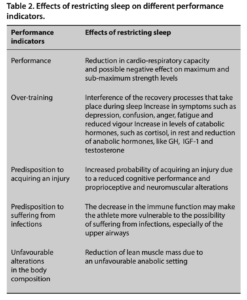
From what I can gather through these tables, and what you have likely gathered as well, is that sleep has a wide-reaching impact on the way we interface with the world around us–not just on a social level, but on a physical, biological level as well.
Of course we know our bodies need sleep, but there is a ton of animal research (here and here) which points to the ways that sleep increases our ability to recover after physically draining or demanding events. There are several studies on humans that point to this as well, although there is more debate in human trials, such as is found in this article. As a result, we can conclude that a lot of our biological, cellular performance, as well as our performance in the physical world, is deeply affected by whether or not we are getting enough sleep to compensate for our exertions.
Sleep disorders are correlated to detrimental our health
About 80 million Americans have sleep disorders and chronic sleep illnesses that remain unaddressed or ignored. Thankfully, there are several sleep studies that focus on sleep deprivation and their relation to other disorders such as obesity, type-2 diabetes, hypertension, reduced immune function, cardiovascular disease, and more. In particular, these studies focus on the ways in which chronic sleep loss affects our ability to recover (from the effects of lack of sleep).
As a result, our body doesn’t perform as strongly, and is more susceptible to other comorbid side effects. The silver lining is, these studies are helping researchers and other organizations understand the deep impact sleep (or lack thereof) can have on our capacity to function healthily, and more responses are being made about this issue across the world at large.
So what kinds of sleep disorders have been most often connected with the conditions I listed above?
The most popular sleep disorders, as related in this super helpful chart on the subject, are insomnia, sleep-related breathing disorders, disorders of excessive daytime sleepiness (narcolepsy), sleep-wake disorders, and parasomnias (sleepwalking, etc.). I’ve included the chart below to help define these disorders further:
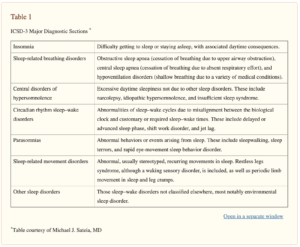
The connections that have been made between these sorts of disorders and the health outcomes of those with them should not be ignored. Sleep apnea has for instance been shown to be “highly prevalent in patients with a wide variety of cardiovascular diseases, including hypertension, heart failure, arrhythmias, coronary artery disease, acute coronary syndrome, and stroke.”
And while sleep is of course likely not the main precursor for the development of these complications, it certainly points to a common thread between certain ailments that all of us surely want to avoid in our lives. Before we move onto looking how we make sure we’re getting enough sleep, here are just a few more research results that emphasize the drastic impact sleep deprivation (even outside of sleeping disorders) can have major impacts on our health, wellness, and even lifespan:
- This article found that sleep deprivation changes the neural, molecular, and immune responses that play a role in disease development in our bodies. As such, chronic sleep deprivation can provide a foundation for (and even exacerbate) cardiovascular and metabolic diseases that shorten our lifespan.
- According to this sleep professional, “sleep is one of the three pillars (diet, exercise, and sleep) of a healthy lifestyle.” Another states that sleep is “critical to health as diet and physical activity”. We can understand then that sleep is one of the most important things we can do to keep our bodies healthy!
- Sleep disturbances are (in this article) shown to be directly linked with the pathogenesis of disease, and shares a relationship with disease mechanisms like hormonal dysregulation, cytokine imbalance, and impaired glucose tolerance.
- This article confirms that sleeplessness is related to immune responses impacts and hormonal secretion (in particular, of our growth hormone!), as well as increases the risk of diabetes and cardiovascular diseases.
How do I make sure I’m getting enough sleep?
While there is still debate in the sleep research community about the best protocol to target sleep disorders or irregular sleep, one theme that came up during my search was that a lot of professionals agree that a pharmacologic treatment (specifically over the long-term) may not be the most effective option against, say, insomnia.
Here’s what one, Dr. Kushida, has to say on the subject:
“Medications really should be considered short-term treatments, because patients tend to develop dependence on, or tolerance to, hypnotic drugs. In our clinic, we commonly see that, over time, medications stop having an effect, and that means that patients may try higher doses of a medication, or keep switching to different medications. So, medications are a temporary solution—they just put a Band-Aid on the problem…”
As a result, many researchers and doctors (like Kushida) are working with non-pharmacologic applications for diseases like insomnia, including cognitive behavioral therapy, or CBT–yet there is so much more to be done, and at least 20 to 30% of people aren’t receptive to this type of therapy in the long-term.
So, what can we do to help ensure we’re getting the best possible sleep? I think the answer comes in two parts. There are different lifestyle changes we can make, and then there are different nutritional choices we can make to help induce sleep–particularly with sleep-boosting supplements and teas. I think it’s important to look at both, and then to start scaling your sleep plan as you figure out what works best for you, and what doesn’t.
Lifestyle changes to improve sleep patterns
First, here are some non-pharmacologic tips to help improve your sleep, and prioritize a good sleep as well:
- Don’t exercise too hard at least 4 hours before bed. Because you’ll get a longer sleep, and will fall asleep quicker after exercise, people often say to exercise before bed. However, this same research has found that exercise performed in the four-hour period leading up to bed-time may actually decrease those effects.
- Prioritize a long-term sleep improvement schedule. I mentioned this earlier, but getting consistent sleep over the long-term will have a direct impact on how well you recover from lack of sleep, or even physical exertion!
- Maintain a relaxing sleep environment. The Sleep Foundation tells us to make sure we’re maintaining a relaxing sleep environment by ensuring our sleep-space is the right temperature, and doesn’t have too much access to electronics.
- Avoid using electronics, reading, or working in your bedroom. When you are doing brain-stimulating activities in your bedroom, your brain doesn’t see your own bed as a rest space. Instead it gets into the groove of work! If you can, separate your work spaces, or give yourself a comfy place to relax and wind down with a book elsewhere in your space. If you live in a one-room space, try a curtain to give the similar effect of separation. Not to mention, your melatonin production will fall if you don’t give yourself enough darkness in the space where you sleep!
- Create a relaxing bedtime routine. As you start to wind down from the day and shut off your work brain, you can start leading yourself to that good old sleep. It might even start with dinner, or putting the kids to bed, but usually you’re looking for simple, small things you can do to signal to yourself that you’re going to bed. For me, I like to wash my face, brush my teeth, put on pajamas, and then listen to a few peaceful songs while sitting quietly on the rug in my room. Then I’ll get into bed, and won’t touch my phone again until morning!
- Don’t touch your phone for at least 20 minutes when you wake up. This is just a tip I’ve heard from friends, but I find that allowing myself to really ‘wake up’ without having the immediate stimulus of my phone really helps me stay awake for the rest of the day. Of course, you may have to turn off your alarm, but otherwise, set that alarm to give you that extra 20 minutes without your phone, or before you have to be ‘on’ for work, and you’ll find yourself feeling that much more rested throughout the day.
- Avoid eating a large meal or snacking before bed. Food is energy, but it’s also work! Your body will want to digest that food, and not only that, turn it into fuel that it wants to use! As your body works to digest, and gives you energy, the likelihood of getting a good rest quickly dwindles. Try keeping your meals early, and if you do get hungry before bed, keep it light!
Speaking of eating…there’s definitely some interesting research out there related to food and sleep, as well as the vitamins and minerals that do wonders to help improve our sleep and resting recovery processes. So while you’re creating a good environment for sleep and making subtle lifestyle changes to prioritize your sleep schedule, you can also include some of these nutritional tips into your routine for better sleep.
Nutritional tips to help improve your relationship with sleep
As the medical field continues to explore different relationships between our bodies and brains, there has been a lot discovered in terms of the relationship between our brain and our gut. It’s not a far stretch then to see how the proper functioning of our brain would promote something like sleep with support from our guts, and the stuff we eat and drink.
Given this connection, I wanted to explore for myself some of the different vitamins and foods that we can eat to help improve our sleep patterns and schedules. To start, here is a comprehensive list that covers all of the good-for-us vitamins and minerals that have been correlated with improved sleep outcomes:
- Melatonin
- Vitamin D
- Probiotics
- Zinc preparations
- Omega 3
- Vitamin C
- Chamomile (for daytime wakefulness, not sleep)
- Vitamin B12
- Thiamine (Vitamin B1)
- Iron
- L-Theanine
- Tryptophan
- Magnesium
(P.S. Valerian is not on this list because, while it does produce drowsy effects on humans, and induces a generally calming effect, no positive effect has been proven to supplement sleep quality. If you find a research study that shows this, please send it my way, but for now using it in combination with other nutritional sleep aids won’t hurt!)
It’s quite something to read through this research and see the intricate ways in which different supplements and foods can affect our bodies and our sleep patterns. For example, melatonin is ultra-effective at improving time to sleep, and even the depth of our sleep. People who are considered normal sleepers were found to consume higher levels of Vitamins B12 and B1. People who are iron deficient often suffer from restless leg syndrome or limb movement during sleep, and studies show that iron supplementation can actually reduce these symptoms.
What is melatonin? Here’s how one article shows it supports our overall health and recovery function during sleep:
“Melatonin is a hormone secreted by the pineal gland, which gives information about the lightness-darkness cycle, with its synthesis suppressed by the exposure of the retina to light. It has been linked to the antioxidant protection against ionizing radiation and a very oxygen-rich atmosphere, slowing down cellular functions during the hours of greatest exposure to those radiations during the day, to be activated during darkness hours when there is a lower risk.”
Since the sleep-wake cycle is something that involves a ton of our internal biological systems, including the release and regulation of several neurotransmitters, serotonin, dopamine, norepinephrine, and more, we can help regulate these systems with different nutrients that target their function. For example, foods that are protein rich in tryptophan can increase serotonin levels in the brain with as little as one gram of intake. Good carbohydrates have also been shown to increase tryptophan levels in our bodies due to the insulin response of these carbs.
Here are just a few more points on what these diet changes can do for us, from this research article on melatonin production:
- Vitamin B12 contributes to the synthesis of melatonin, providing grounds for eating foods high in B12, including fish, dairy, poultry, and eggs.
- Magnesium directly feeds the production of natural melatonin as well, though dosage and its effects on sleep still require further study. Nevertheless, magnesium rich foods like almonds and cashews might help improve melatonin production.
- Less zinc in your body has been correlated with decreases in melatonin, so zinc supplementation might be a great route to keep your melatonin levels at homeostasis.
- L-theanine has been shown to reduce stress with great calming effects and no drowsy side-effects, and is luckily found in green tea leaves! It has even been shown to reduce hyperactivity symptoms in children with ADHD.
Of course, I want to be clear that you should always talk to a medical professional as you begin exploring which options to pursue–particularly if you do have an existing sleeping disorder, if you are pregnant, or if you are on existing medications. Then you can get an established opinion on what steps to take moving forward with the proper research and information behind you to back you up.
With that said though, I think you’re ready to begin “the cycle” of improving your sleep to maintain better overall health!
Time to improve your sleep for preventative healthcare
As I’ve said throughout this article, it’s important to keep an eye on your sleep, and to seek long-term improvements. Mind the pun, but improving your sleep isn’t going to happen overnight! From what I’ve discovered, it takes long-term commitment to improve symptoms caused by lack of sleep–especially if you’re the kind of person who loves your every-day coffee!
What I’ve tried to share here then, is a little support for why you should be improving your sleep, and some tips on how you can improve your sleep. Based on these tips and research, I’m hoping you can take some of it with you to personalize your own approach to improving your sleep. Only you are going to know what works for you, and I admit that it’s taken me some time to figure out the right ways to get my sleep on track–particularly when suffering from a chronic condition that is primed for fatigue.
So, if you’re wanting to have more energy in your life, if you want to prevent disorders and other healthcare anomalies in your body, then I would say sleep is one of the most impactful, non-drug options we have to keep our health in peak condition. I know I’m going to be doing even more now to prioritize sleep, and I think you may feel the same! That’s why I’m also hoping you’ll share your sleep stories with me on Instagram, and your own methods for what’s worked for you. Then I can share them with others in the hope that we all get ourselves the rest we need!
Until next time, and with all my love,

Lena
SUBSCRIBE
Get the latest updates, sneak peeks and more.
 Back To All Posts
Back To All Posts Previous Post
Previous Post